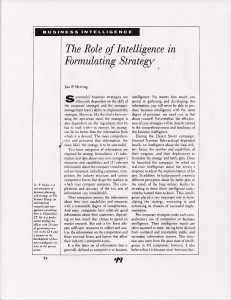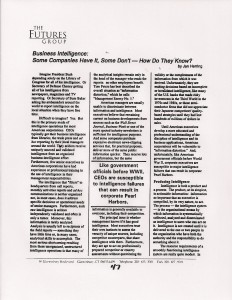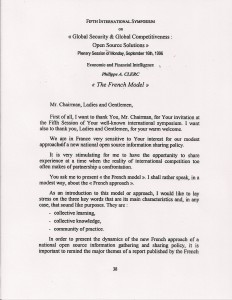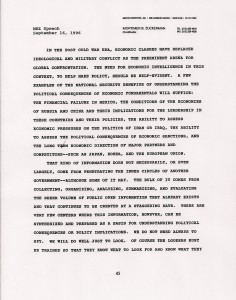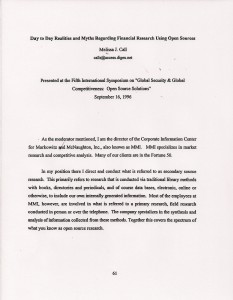
1996 Clerc (FR) The French Model for Economic and Financial Intelligence
Commercial Intelligence, Historic Contributions
Philippe Clerc has been active in World Information Forum and related activities at the international level, and in France within the emergent economic and financial intelligence environment. Below is his presentation to OSS '96.
It merits mention that the French learned a hard lesson in 1993–their steel industry realized that their competitive intelligence effort against all other steel industries had failed because they did not consider steel substitutes–the plastics industry emerged overnight and supplanted steel in the automobile industry and elsewhere. It was while learning this in Paris in 1994 that we realized it was vital to “cast a wide net” and not narrow-cast open source information acquisition.
1996 Strassmann (US) U.S. Knowledge Assets: Choice Traget for Information Crime
Commerce, Commercial Intelligence, Government, Historic Contributions, Law Enforcement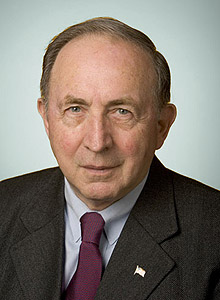
Whenever we get depressed about the inability of large organizations to “hear” we just remind ourselves that no one listens to Brent Scowcroft or Paul Strassmann either despite their stature as intellectual giants.
Strassmann is an enterprise unto himself after decades of being a CIO for Xerox, DoD, and then a reprise at NASA for Sean O'Keefe. His books are among the most vital for executives seeking to actually understand the business value of computing. Below is his presentation to OSS '96.
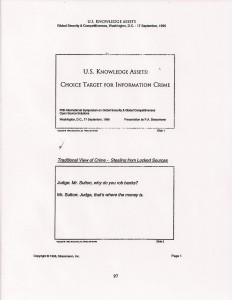
1996 Zuckerman (US) Economic Intelligence and the National Interest
Commerce, Commercial Intelligence, Government, Historic Contributions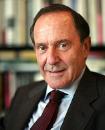
Something of a renaissance man, Mort Zuckerman is active across real estate, the media (US News & World Report), the talk shows, and the Smithsonian cultural circuit. Below is his hard-hitting commentary as presented at OSS '96. Read this carefully. See especially the use of the word “manic.” The US Government is not trained, equipped, or organized to be intelligent. The consumers of intelligence do not represent the public as much as they do the recipients of the public's largesse, and do not know how to do intelligence in the public interest. The secret intelligence community refuses to create a strategic analytic model, and continues to be driven by budget, technical, and bureaucratic consideration–inputs–rather than desired outcomes.
1994 Basch (US) Secrets of the Super-Searchers
Commercial Intelligence, Historic Contributions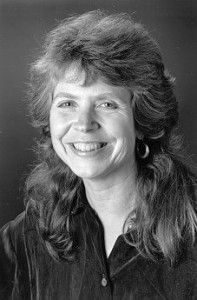
Reva Basch is the hands-down Top Gun of the information broker world, now in retirement. She started the Association of Independent Information Professionals (AIIP), she led the series of books on Secrets of the Super-Searchers (one for each market segment) and did many other extraordinary things that epitomized the craft of public intelligence. She remains the gold standard. Below is her presentation to OSS '94.
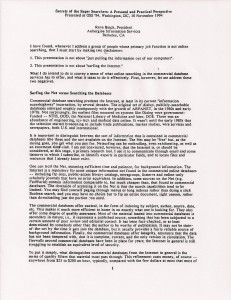
1994 Collier (UK) Future of the Information Industry and a New Information Paradigm
Commercial Intelligence, Historic Contributions
Harry Cllier created the Association for Global Strategic Information (AGSI) and has been the primary publisher for both Ben Gilad (arguably the top commercial intelligence advisor in the world) and Stephen E. Arnold (arguably the top information technology patent and capabiltiies analyst in the English-speaking world).
He has long been a “hub” for the information industry, and remains one of the most honorable and erudite individuals representing the craft of public intelligence.
Below is his presentaiton to OSS '94.
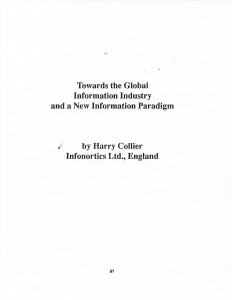
1993 Herring (US) The Role of Intelligence in Formulating Strategy
Commercial Intelligence, Government, Historic Contributions, Strategy, Strategy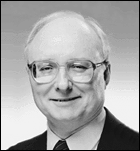
Jan Herring, as National Intelligence Officer (NIO) for Science & Technology (S&T) at the Central Intelligence Agency (CIA), tried in the 1970's to adddress the “severe deficiencies” in access to open sources of information. Historically, it has been the S&T analysts that understood the availability and value of open source information in all languages. He failed within government, but did not give up. He went into the private sector and created the Academy of Competitive Intelligence (click on his photograph to learn more) with Ben Gilad and Leonard Fuld, two of the half dozen “top guns” in the English-seaking competitive intelligence community world-wide. If Stevan Dedijer is the father of business intelligence (qua decision-support), then Jan Herring is surely the father of business intelligence in the USA, and a global pioneer in training people to use unclassified analytic sources and methods of inestimable value to any group.
Unlike most, Jan Herring also understand the vital relevance of intelligence to the devleopment of strategy. Below is one of his seminal papers on this topic. See also his short paper on Business Intelligence.
